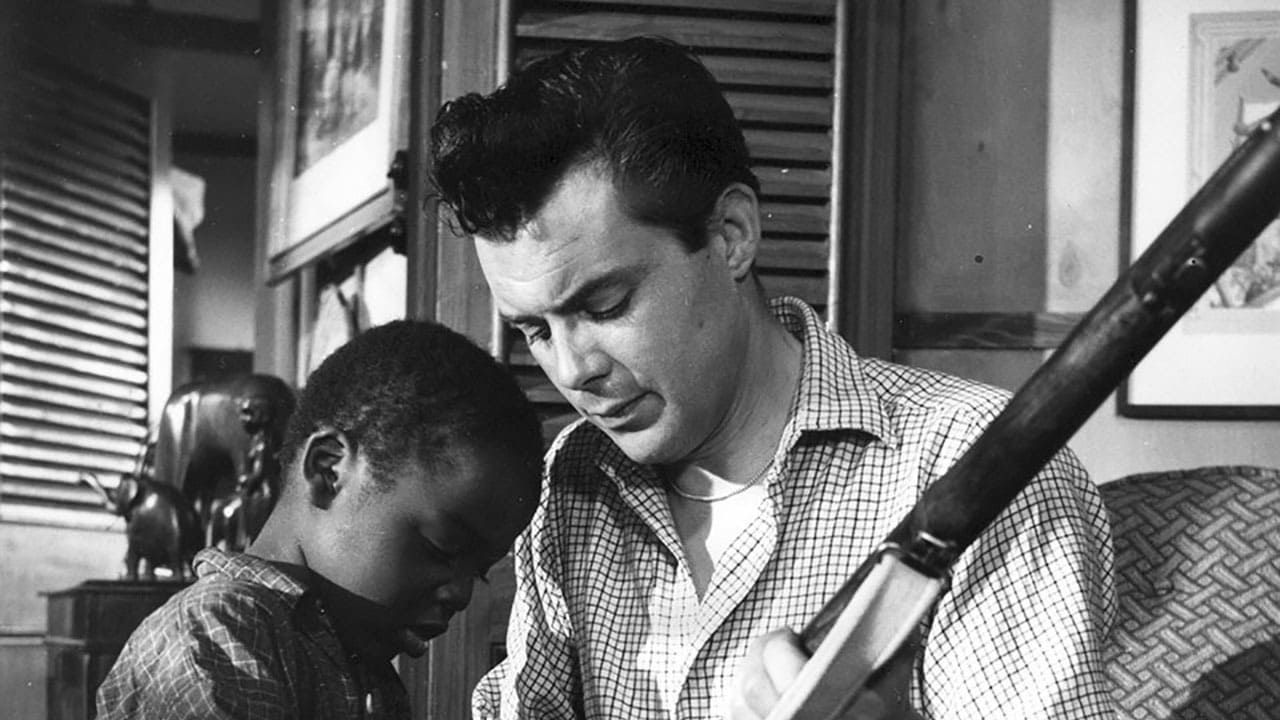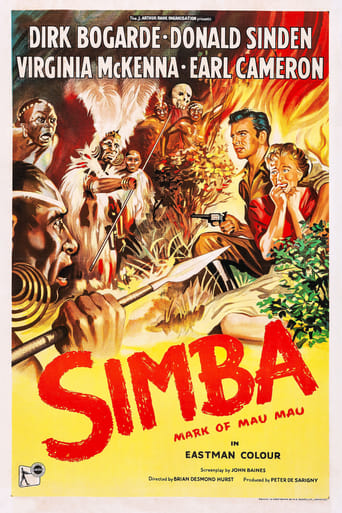Linbeymusol
Wonderful character development!
Cathardincu
Surprisingly incoherent and boring
CrawlerChunky
In truth, there is barely enough story here to make a film.
Sabah Hensley
This is a dark and sometimes deeply uncomfortable drama
bkoganbing
One of my biggest complaints about American cinema films concerning Africa is that they are complete pulp fiction and give us no real understanding of the continent. How could it since we have no real ties, even colonial ones with Africa. Simba however which is British made and shot on actual location in Kenya Colony which it was at the time this film was made is a good insight to the problems of an Empire in its last gasp and they knew it.Kenya took longer than most of sub-Saharan Africa to be free because of the Mau Mau rebellion. But free it became within a decade of Simba reaching the screen. Dirk Bogarde stars as a young man come to Africa to work with his brother on the family farm in Kenya. But on his arrival he discovers that the brother has been murdered by the Mau Maus.This does engender some racial attitudes in Bogarde, understandable to say the least. Seeing the better angels of Africa's nature is Virginia McKenna the daughter of neighboring farmers Basil Sydney and Marie Ney. Dealing with it from a military point of view is Donald Sinden in charge of the local constabulary which also is staffed with native troops. These players and the rest of Simba's film crew took their lives in their hands going there to make this film. Another American film on Africa, Safari with Victor Mature and Janet Leigh, also dealt peripherally with the Mau Mau movement and was shot there a year later. This is the better product by far.Mention must also go to Earl Cameron playing the European educated black doctor who is caught between the white colonials and his own natives and this violent outbreak which is harming all. Cameron delivers a fine performance, his is the voice of emerging Africa and Kenya in particular.Don't miss this one if it's broadcast.
CarolinianDude
For the historical-minded, this is by far the best film about the Mau Mau rebellion in Kenya. The mood of the country at the time is very well reflected here. The attitude of the colonials and the Africans are both very accurately portrayed, as is the way in which Mau Mau divided both communities, both African and British. While the un-PC nature of the time may bother some, it is quite accurate. While the style of filming may bother some, if you watch it for the acting and the story you'll enjoy it. Wonderful movie about Kenya. As someone who has spent many of the best years of my life in Kenya, this movie will always be special to me, my father lived in Kenya from 1947-1963, throughout the height of Mau Mau, and he praises the way in which the film really captures the moment as well.
dbdumonteil
This movie may be accused of racism.Perhaps so.But you could also blame "stagecoach" and a lot of westerns before "broken arrow" as well :the Indians were the villains,just as the natives are here.Let's be serious!It was half a century ago and at the time the writers had not the hindsight we have today.The precedent user saw the movie through the eyes of the 2004 audience obviously the politically correct one.Judging by the rating,there are users who disagree and I'm one of them.First of all,"Simba" is not poorly executed,it has a good screenplay,fine actors (Bogarde and Virginia McKenna),beautiful landscapes...That the Africans should be shown as primitive,cruel and mindless does not prevent some of them from becoming educated and wise:"I studied for six years ,the black doctor says,to save lives ,not to destroy them".Two years later in "something of value" ,Richard Brooks showed a native afraid of thunder!"Simba" is the British forerunner of Richard Brook's work.In "Simba" anyway ,the White are not necessarily the heroes.See how Bogarde refuses to shake hands with the doctor.And the last picture of the movie is a black child's face ,a curious choice for a would be racist flick.
David Atfield
Set in Kenya in the 1950's, this film attempts to portray the conflict between black and white in an even-handed way. But it can't help making the whites the victims and the blacks the villains. One token good black man (a doctor) is hardly sufficient to make up for the superstitious and blood-thirsty mobs that ransack the country killing viciously and without mercy. This film is even more reprehensible given the dreadful events now occurring in Zimbabwe where white farmers are being murdered by black squatters. I'm sure a black African audience would find this film further motivation to hate the arrogant whites. How can we sympathise with a man who insists that the blacks are "children mentally" and with our hero and heroine who insist on calling their native workers "boy"? I've no doubt that the film-makers were sincere in trying to promote a message of peace - but this peace is portrayed as achievable only on the white man's terms.To make things worse the film is poorly made, with clumsy editing from stand-ins for the stars wandering around African locations to close-ups of the real stars with badly rear-projected locations. This constant shuffling becomes so silly that it destroys any chance the film had at credibility. By 1955 we really expect the cast to be on location. This is one dinosaur of a film that should be laid to rest. I'm sure the great Dirk Bogarde was bitterly ashamed of it in later life.

